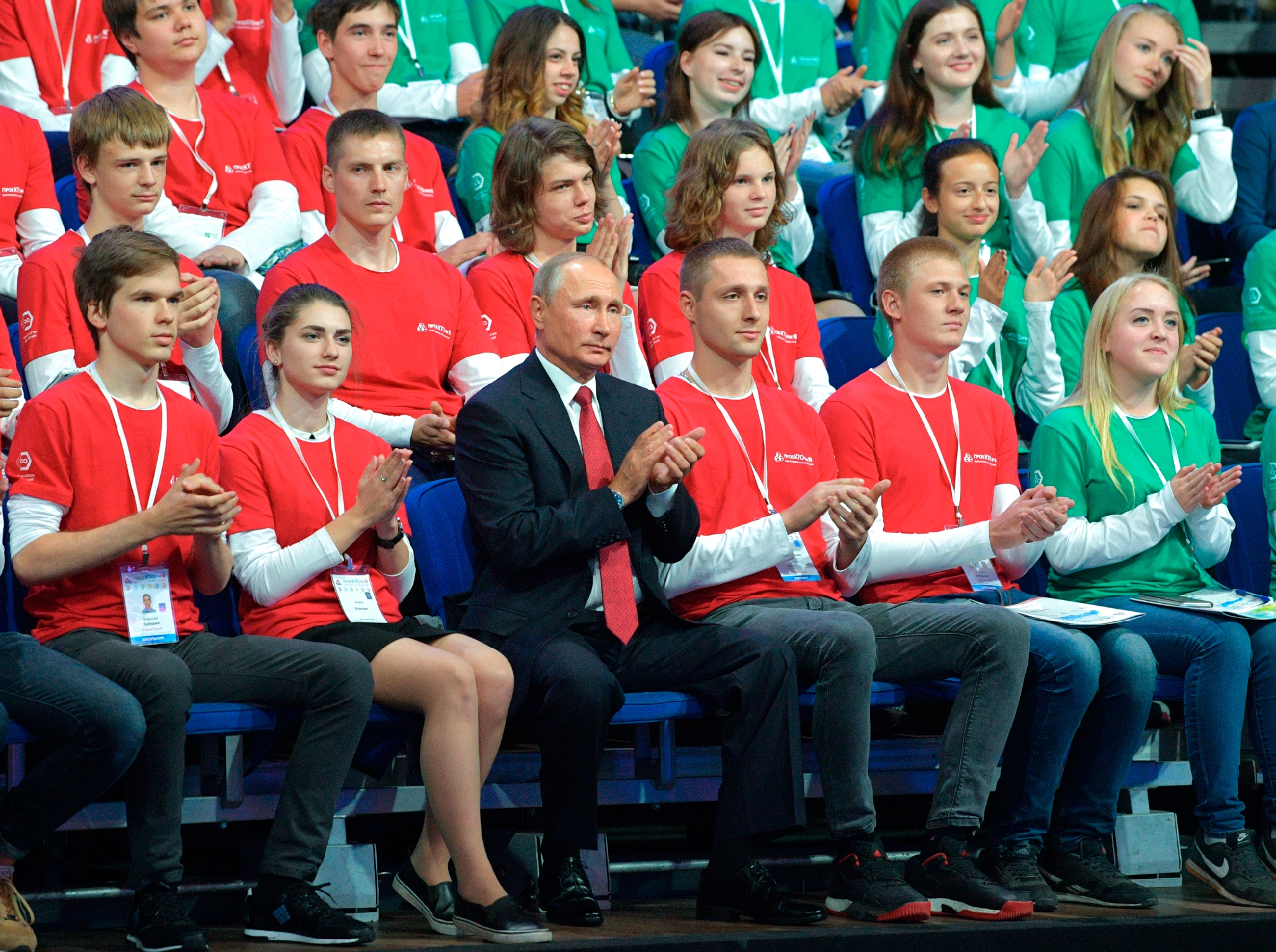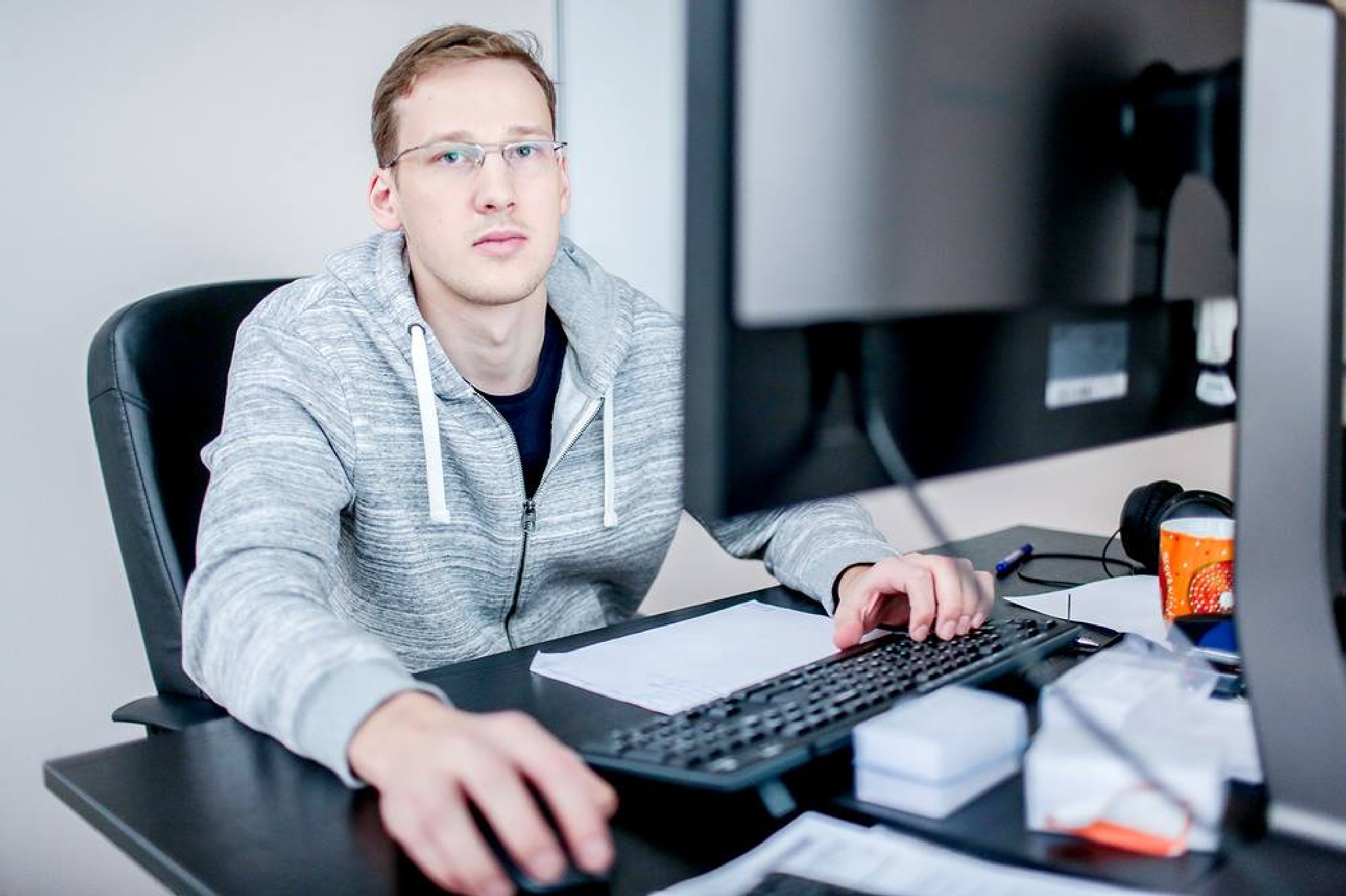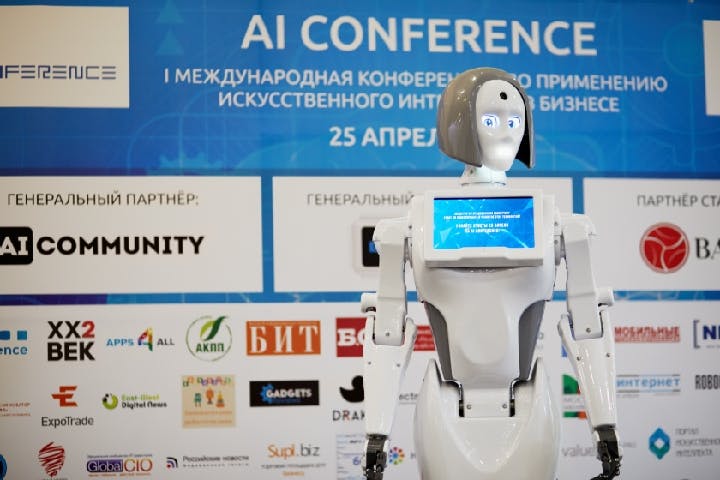Spring 2018
Russia Tries to Get Smart about Artificial Intelligence
– Jill Dougherty and Molly Jay
From the reign of Peter the Great to the Soviet era, and now under President Putin, Russia has been intent to, as Lenin termed it, “catch up and surpass” the West. That ambition applies to AI, too.
September 1, 2017. It was the first day of school in Russia, a much-beloved unofficial holiday, and President Vladimir Putin was on stage in a national TV broadcast, chatting with jeans-clad teenagers about the future.
“Artificial intelligence is the future,” he told them, “not only for Russia, but for all humankind. It comes with colossal opportunities, but also threats that are difficult to predict. Whoever becomes the leader in this sphere will become the ruler of the world.”
Then, this March, in the final moments of Putin’s re-election campaign, came a stern message to lawmakers at his annual address to parliament: “The speed of technological progress is accelerating sharply... Those who manage to ride this technological wave will surge far ahead. Those who fail to do this will be submerged and drown.”
“As soon as possible,” Putin said, Russia “needs to eliminate all barriers to the development and wide use of robotic equipment, artificial intelligence, unmanned vehicles, e-commerce, and big-data-processing technology.”

Spurred from the top, could Russia one day muster real competition with the great powers in the AI field? The implications of the question are great, as indeed, current and potential applications of the technology cross sectors and range from the beneficial to the malign. Russia’s recent social-media-based propaganda campaigns to influence Western elections employed only relatively basic AI, but achieved certain impact. Today, it is unclear whether the country can achieve top AI status, but from Washington to Beijing, other capitals are tracking Moscow’s efforts.
The undisputed world leaders in artificial intelligence are the United States and China. Compared to their investment in the field, the Russian government lags far behind. According to the Russian tech website cnews.ru, the size of the AI/machine learning market in the country was less than $12 million in 2017. That’s estimated to grow, and markedly, to some $460 million by 2020. Still, the figure is dwarfed by the roughly $7.4 billion that the Pentagon budgeted last year on AI and allied fields like big data and cloud computing.
Yet even if Russia’s AI industry is in its nascence, Google’s former CEO, Eric Schmidt, is nervous.
Looming larger and larger in the Defense Department’s rear-view mirror is China. Beijing alone plans to build an artificial intelligence development park with $2.12-billion price tag. By 2020, the country envisions developing a domestic AI industry worth more than $24 billion, a figure that the government says will more than double five years after that.
Yet even if Russia’s AI industry is in its nascence, Google’s former CEO, Eric Schmidt, is nervous. This January, at a BBC event in London, he was asked about Vladimir Putin’s “ruler of the world” prediction.
“I’m very concerned about this,” he said. “I think both the Russian and the Chinese leaders have recognized the value of this, not just for their commercial aspirations, but also their military aspirations.”
From Peter the Great in the 18th century to the Soviet era, and now under Putin, Russia has been intent to, as Lenin termed it, “catch up and surpass” the West. (In this case, the East, too.) The president’s urgings should be viewed, writes Samuel Bendett of the American Foreign Policy Council, as “a recognition of Russia’s current place in this unfolding technology race, and of the need by the nation’s government, private sector, and the military to marshal the needed resources to persevere in this domain.”
Find That Face
If Russia is to “ride this technological wave,” as Putin describes it, the country will need people like Artem Kukharenko.
About three miles north of the Kremlin, in a small office inside a high-rise building, Kukharenko is seated at his computer close to a large window, silhouetted against Moscow’s skyline. On his computer screen is a photograph of a woman’s face with a fine net of tiny white lines displayed across it. It’s a depiction, he tells me, of the facial recognition software that he and several fellow computer geeks developed and then used as a springboard to start their company, NtechLab.
The software relies on AI technology, employing algorithms to rapidly compare photos of individuals against a face-image database. It can be used for a wide variety of purposes: verifying a face to unlock a smartphone; scanning shoppers to compile data on customers; locating missing people; finding a potential date; identifying criminals; and, in some cases, targeting political opponents.

Kukharenko is as close to a Silicon-Valley-style entrepreneur as you can get in Russia. The son of a chemist and a physicist, it was perhaps genetic fate that he was a math whiz from an early age. As a kid, he says, his love of computer games led him to learn coding, so he could make his own. He eventually was accepted by the Faculty of Computational Mathematics and Cybernetics at Moscow State University, Russia’s premier training center for computer science, leading to freelance gigs at Purdue University’s e-Lab and Samsung’s Moscow research center.
Kukharenko’s company, which opened its doors in 2015, now has a staff of 50 – most of them developers and researchers in the area of neural networks, computer systems modeled on the human brain. Its work is earning international notice. Last November, NtechLab aced out 16 competitors to win the Face Recognition Prize Challenge, a competition run by the Office of the U.S. Director of National Intelligence, outstripping the others in terms of both accuracy and speed of recognition.
FindFace, one early application of the facial recognition software, allows users of Russia’s largest social media network, VKontakte, to find friends by searching through photos. Its popularity, though, has not come without ethical issues: A young artist in St. Petersburg who had privacy concerns about FindFace started a project he dubbed “Your Face is Big Data.” After taking pictures of passengers on the subway without their permission, he then matched them with their VKontakte page. He told GlobalVoices that, theoretically, the service “could be used by a serial killer or a collector trying to hunt down a debtor.” In another worrying use of the technology, a Russian imageboard used FindFace to identify and “out” women who had appeared in pornography or who had worked as prostitutes.
Kukharenko counters that any technology, not just his software, can be used for good ends or bad: “With this service, we wanted to demonstrate that such technology exists, that it’s not part of a fantasy film – and people should think twice about what information about themselves they put out there.”
He points to the benefits of NtechLab’s technology, such as “smart demographics” for retail companies. Using closed-circuit television cameras to scan shoppers, facial recognition can “show that you usually have women who are smiling, let’s say, who are from 30 to 40 years old and who buy specific products,” he explains. That helps merchants zero in on what should be displayed and what their customers want.
In so-called “smart cities” – cities and towns that leverage modern technology and data to improve efficiency and quality of life – facial recognition can be used in conjunction with CCTV. “As people pass by those cameras,” Kukharenko explains, “you can compare them to a database of criminals and, if a criminal walks by, a report can be sent to law enforcement.”
In Moscow and in the Tatarstan region, the company has agreements to pilot-test its system of “video analytics” in conjunction with the local governments’ CCTV cameras. According to the news website Meduza, Moscow alone has approximately 100,000 cameras in buildings and courtyards, on roads, in public transportation, and in other locations.
In the Ryazan region, the Interior Ministry is using a mobile biometric system equipped with facial recognition by NtechLab. “It allows them to identify faces at mass events,” Kukharenko says – which raises the possibility that police could use the technology to identify and arrest political protesters. He stresses that his company “does not work directly with governments.” Rather, it works with other companies that do actively work with governments – a network of partners that stretches from New Zealand to Brazil, including the U.S. and China.
Should it choose to emulate the Chinese model, Russia has a long way to go; there are an estimated 170 million surveillance cameras in China, with plans to install 400 million more in the next three years, according to the BBC. China calls it the world's biggest camera surveillance network. During the Lunar New Year holiday, Chinese police even used facial-recognition sunglasses, made by a Beijing-based company, to surveil large numbers of citizens traveling to visit relatives.
Lying with AI
Artifical intelligence, in Russia and elsewhere, has the potential not only to help expose the truth – as in revealing shopping patterns or uncovering criminals – but to deceive as well.
A study by Harvard University’s Belfer Center warns that AI will “dramatically enhance capabilities for the collection and analysis of data, but also the creation of data.” In intelligence operations, there will be more sources from which to discern the truth, the paper argues, but “it will also be much easier to lie persuasively.”
Russia already used machine learning – a subset of AI that enables machine to improve at tasks with experience – to deploy armies of bots, targeted ads, and more during the 2016 U.S. presidential campaign. Since the vote, post-mortems have revealed the specifics of how Russian intelligence exploited social media platforms like Facebook to create fake user accounts and, from those, spread disinformation, disseminate divisive content on issues like racial justice and gay rights, and sway support.
In a prime example of the dual nature of AI, Facebook CEO Mark Zuckerberg told Congress last month that AI would help win the cyber “arms race” with Moscow.
In contrast to China, Russia rarely uses propaganda in the West to tout its own achievements. Instead, Moscow seeks to undermine Western democracy and exploit failures and weaknesses in Western institutions. Its approach to AI sometimes mirrors that strategy.
“Right now, Russia does not have the means to compete with the United States and China, which have both marshalled more significant human capital and strategic investment,” says Eleonore Pauwels, director of the AI Lab at the Wilson Center. “Yet, the AI know-how that Russia has can be used for creating chaos on the international scene. Creating chaos is cheap, but comes at a cost for other actors.”
(In a prime example of the dual nature of AI, Facebook CEO Mark Zuckerberg told Congress last month that AI would help win the cyber “arms race” with Moscow.)
There are more sophisticated AI-powered disinformation applications on the way. One striking example is machine learning technology recently developed by researchers at the University of Washington that can literally put words in the mouth of a political leader. The Seattle-based team took audio of former President Barack Obama speaking about terrorism and other subjects, converted that audio into mouth shapes using a mouth synthesis technique, then joined that with video of Obama recorded at another time.
Could a lip-synching president “declare” war on another country? It’s among the more hypotheticals of a new, AI-equipped world.
A Military Focus
For now, Russia’s drive for AI parity is concentrated primarily on its military. In Syria, Moscow uses AI-equipped drones as well as an AI-equipped unmanned underwater vehicle that seeks out unexploded ordnance. The Russian armed forces also have ambitious plans to implement AI technology in combat aircraft, missiles, and electronic warfare systems, an area in which they already have formidable expertise.
To develop new, Russian-made technology, however, requires unleashing a new generation of developers – and a new philosophical approach – says the American Foreign Policy Council’s Bendett. “A lot of young scientists, and young Russians in the Russian military, grew up in the digital age, just like their American and Chinese counterparts,” he says. “Many of these young people probably went and studied overseas and brought that experience home, so the Russian military will probably build on that.”
But can it keep that talent home? In 2010, the Kremlin broke ground on its much-hyped Skolkovo Innovation Center, a sprawling tech campus on the outskirts of Moscow, which aimed to foment start-up culture and ignite venture capitalism. Results have been paltry and some critics blame the top-down approach. “The MOD is trying to install the American-style culture of flexibility to certain military innovations and developments,” says Bendett. But translating Silicon Valley into Russian won’t be easy: “Russia lacks that type of infrastructure right now and is trying to re-create it almost from scratch.”
In March, at the Defense Ministry’s first conference on artificial intelligence, Minister Sergey Shoigu urged military and civilian scientists to join forces in developing AI technology which, he said, was crucial for countering “possible threats to the technological and economic security of Russia.” That stated approach is similar to the Pentagon’s DIUx program, which provides capital to fund pilot contracts for commercial innovation with military applications. The Russian government also has created the Foundation for Promising Research, which supports high-tech innovation for the country’s defense and national security. It’s modeled on the U.S. government’s Defense Advanced Research Projects Agency, or DARPA, which works with innovators inside and outside of government to invest in breakthrough technologies.
The Defense Ministry is even planning to build an entire city for military innovation. An article on the website Red Star, the Ministry’s Soviet-born official publication, describes “Era” as a “military innovation technopolis.” Located in Anapa, a picturesque town on Black Sea, it would provide more than 2,000 young military scientists the opportunity to pursue research in eight fields, including AI, robotics, and super-computing. While the project sounds reminiscent of the “closed” military-industrial cities in which scientists lived and worked during the Cold War, the plan is to build Era in cooperation with the private sector.
“This is a more modern take, although it remains to be seen if the Russian government has learned anything from Skolkovo,” says Michael Kofman, a research scientist at CNA Corporation. “It's rather difficult to create advancements in that sort of environment, nor is it especially attractive to the current generation of technology developers.”
Even as it tries to mimic U.S.-style public-private cooperation, Russia is studying China’s strategy, which combines heavy government control with private-sector business and academic research. In “trying to walk the middle line” between the two approaches, Bendett says, Moscow is looking to arrive at “something highly unique to Russia.”
Math and Dreams
In February, America’s premier inventor, Elon Musk, and his SpaceX engineers successfully launched a rocket with 27 engines firing in unison, the kind of feat the USSR tried – and failed – to accomplish more than half a century ago. “Nowhere did [the] launch of SpaceX's Falcon Heavy rocket echo as powerfully as in Russia,” one Bloomberg reporter wrote.
“We aren't out of mathematicians. What we are out of is dreamers.”
Indeed, the lesson from Musk’s accomplishment wasn’t lost on Russia’s leaders, nor its scientists. Even with the full weight of governmental funding and political support, Moscow isn’t planning on launching anything similar until 2028. Vitaly Egorov of Dauria Aerospace, a private satellite manufacturer that works with the Russian government, was rueful on Facebook: “We aren't out of mathematicians. What we are out of is dreamers.”
But back in his Moscow office, NtechLab’s Kukharenko still yearns to perfect his facial recognition technology – to make it faster and more precise. “We want to remain the technological leaders in the area,” he says. And will there one day be an international agreement, like a nuclear arms control agreement, on acceptable use of the kind of technology he creates? “Maybe not on AI overall, because it’s a very broad subject,” he tells me, “but with facial recognition, yes, there probably will be some limits. Facial recognition gives you an indisputable advantage.”
The idea of international AI governance is not at the front of Kukharenko’s mind, even as his own endeavors are helping technology outpace regulation efforts. On that issue, the world as a whole, not just Russia, may soon find itself playing catch-up.
***
Jill Dougherty (@jillrussia) is a global fellow at the Wilson Center’s Kennan Institute and a CNN contributor. She reported full-time for CNN for more than three decades, including as Moscow bureau chief.
Molly Jay is chief digital officer at the University of Washington's Evans School of Public Policy and Governance. She previously held positions at Amazon and POLITICO and was a consultant for Microsoft.
Cover photo: KIKI the robot greets participants at a private sector conference on AI and business applications in Moscow, April 25, 2017. (Courtesy of Shutterstock/Pavel L Photo and Video)
